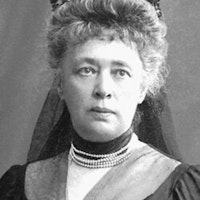One of the eternal truths is that happiness is created and developed in peace, and one of the eternal rights is the individual’s right to live.
One of the eternal truths is that happiness is created and developed in peace, and one of the eternal rights is the individual’s right to live.
Bertha von Suttner

Created in Peace
Topic: Global Peace & Development
One of the eternal truths is that happiness is created and developed in peace, and one of the eternal rights is the individual’s right to live. The strongest of all instincts, that of self‑preservation, is an assertion of this right, affirmed and sanctified by the ancient commandment ‘Thou shalt not kill.’ … Up to the present time, the military organization of our society has been founded upon a denial of the possibility of peace, a contempt for the value of human life, and an acceptance of the urge to kill.
Bertha Sophie Felicitas Gräfin Kinsky von Wchinitz und Tettau, later known as Bertha von Suttner, was born on 9 June 1843 in Prague, then part of the Austrian Empire (today the Czech Republic). Her father, Franz Michael de Paula Josef Graf Kinsky, an Austrian field marshal, died before her birth, leaving her mother, Sophie Wilhelmine von Körner, to raise her in more modest conditions than her noble title suggested. From an early age, she studied languages, music, and literature, which fostered an independent outlook that shaped both her writing and her later advocacy for peace.
In 1876, Bertha von Suttner briefly worked as secretary to Alfred Nobel in Paris before marrying Arthur Gundaccar von Suttner. The couple spent nearly a decade in Georgia in the Russian Empire, supporting themselves through writing. It was during this period that she developed her literary voice. Returning to Austria in 1885, she gained international attention with her 1889 novel Die Waffen nieder! (Lay Down Your Arms!), a powerful account of the human cost of war. The book, widely translated and published in multiple editions, became one of the central works of the peace movement.
In the years that followed, Bertha von Suttner became an important leader in peace activism, organizing societies, addressing international congresses, and continuing her writing on disarmament and human rights. Her long correspondence with Alfred Nobel is thought to have influenced his decision to establish the Nobel Peace Prize. In 1905, she became the first woman to receive that award. She died in Vienna on 21 June 1914, just weeks before the outbreak of World War I, leaving behind a legacy that linked literature, advocacy, and the conviction that human progress depends on peace and, as she wrote, “fair and equal cooperation between the sexes.”
Bertha von Suttner. Nobel Lecture: The Evolution of the Peace Movement, delivered 18 April 1906. Bertha von Suttner – Nobel Lecture. NobelPrize.org. Nobel Prize Outreach, 2025. Accessed 16 Aug. 2025.

Bertha von Suttner
Theme: Peace

About This Bertha von Suttner Quotation [Commentary]
Bertha von Suttner names “one of the eternal truths” as the fact that “happiness is created and developed in peace.” She joins this to “one of the eternal rights,” which is “the individual’s right to live.” The “strongest of all instincts, that of self-preservation,” affirms this right, and it is further “sanctified by the ancient commandment, ‘Thou shalt not kill.’” Her sequence shows how peace and life are inseparable, bound both by human instinct and by moral command.
She then turns to what threatens this truth. “Up to the present time, the military organization of our society has been founded upon a denial of the possibility of peace, a contempt for the value of human life, and an acceptance of the urge to kill.” By setting this reality directly against the “eternal truths” and “eternal rights,” Suttner reveals the contradiction between what people know to be sacred and what their institutions continue to practice.
Her words draw the contrast clearly: on one side, “happiness is created and developed in peace” and “the individual’s right to live”; on the other, a system built on “denial of the possibility of peace, a contempt for the value of human life, and an acceptance of the urge to kill.” She held to these convictions until her death in Vienna on 21 June 1914, only weeks before the outbreak of World War I. What she left behind was a vision that joined literature and advocacy with the belief that human progress depends on peace and, in her own words, on “fair and equal cooperation between the sexes.”
Madame Nobel [de] (Eine Liebe für den Frieden – Bertha von Suttner und Alfred Nobel)
The 2014 television biopic Madame Nobel (Eine Liebe für den Frieden – Bertha von Suttner und Alfred Nobel), directed by Urs Egger and adapted from Esther Vilar’s play Mr. & Mrs. Nobel, portrays the complex personal and intellectual bond between the pacifist author Bertha von Suttner and the industrialist Alfred Nobel. It dramatizes their brief but profound connection—sparked during Suttner’s time as Nobel’s secretary—against the backdrop of political and emotional choices, including her marriage to Arthur von Suttner and Nobel’s eventual founding of the Peace Prize. The film premiered on December 10, 2014 on ORF (Austria) and on January 3, 2015 on Germany’s Das Erste, offering a restrained yet thoughtful cinematic meditation on how their relationship influenced the emergence of an enduring symbol of peace.
Additional Bertha von Suttner Quotations
Resources
Related Quotes
Copyright © 2017 – 2026 LuminaryQuotes.com About Us